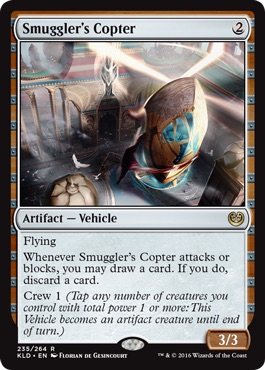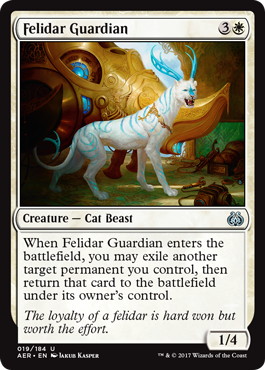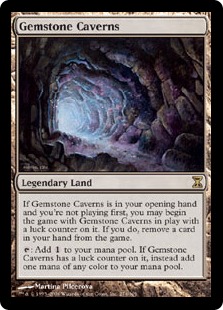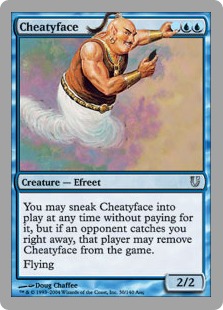As Magic players, we all love our game, and want to make it as good as it can be. Unlike for other games, we proved times and times against that we can actually do it: just two years ago, Wizards tested and then implemented the “Vancouver” mulligan (named after the Pro Tour where it had its trial-run). This was a major success, resulting in a widespread consensus that games are more enjoyable now. The reason for this success was that no one likes being hurt by variance and misfortune before the game even begins, and a better mulligan meant less frustration and, ultimately, more fun.
But if you want to keep looking in that direction, I feel like another issue could be scrutinized: the toss.
Why Is the Toss Important?
A short answer to this question would be:because when you win the toss, you tend to win the game a little bit more often. In other words, if you lose the toss four times in a row, you are at a serious disadvantage even before you start playing your matches. And this is not an unlikely occurrence, since it will happen to one out of sixteen players at any given tournament, which means that at a random GP with about 1600 players, a hundred person will be in that situation. Some of them will still win, other will lose for other reasons, few will just not notice it or not care, but some of them will notice it and grow frustrated if they scrub out early in day one. Which is not good.
For example, if you look at Modern leagues on MTGO, the player going first has a winrate of 54%. Assuming every player is rational and elects to play first when they should, that basically means that winning the toss increases your odds to win a match by 4%. That number obviously depends on the format and changes all the time (I would assume that it was a bit lower in a format like Battle for Zendikar draft, and much higher in Amonkhet due to how powerful the exert mechanic is). Note that in some older formats, it might even be advantageous to be on the draw (I am not sure since I was just starting to play, but I feel like Shards of Alara could have been one of those), but the issue still stands: one player will be at a disadvantage.
I know, I know: in the long run, the god of statistics will make sure that you win the toss around 50% of the time, and things will balance themselves. But truth is, that is very little compensation when you travel 800 kilometres, test for a week and drop after round four while feeling like you’d be 4 and 0 had you won your tosses. I, for one, would not be that bothered, but I heard so many people complain about it that I believe it is worth fixing.
Making the Toss Irrelevant
Lots of players are aware of the issue of “on the play edge”. Most complaints about recent formats have been about play-dependant they are (except when it was about how much it depended on 《Aetherworks Marvel》 hitting, but you know, the rest of the time). Just looking at last year, three cards have been deemed unfun partly because they were just too hard to beat on the draw and made it feel awful to lose a game just because your opponent was better at rolling a dice. 《Smuggler's Copter》, 《Felidar Guardian》 (as a combo with 《Saheeli Rai》) and 《Reflector Mage》 all fall into this category. To a certain extent, every planeswalker Wizards print makes the issue a little worse: just think how much harder it is to beat a T4 《Gideon, Ally of Zendikar》 on the draw than on the play.
Lots of ideas have been studied to fix this, but I will just discuss one: “the coin”, inspired from Hearthstone, which lets the player on the draw start the game with a functional 《Lotus Petal》 in hand (or maybe a non-artifact 《Lotus Petal》 token into play to avoid too many shenanigans, but whatever).
Let me be crystal clear: I think this idea, and pretty much every idea that is looking in this direction, is bad. The reasoning behind it is basically “let us bend the rules in order to give the player on the draw a 50% winrate, and then no one cares if you win the draw or not”. And that would work for a game like Bridge, where the rules remain unchanged forever. But not for Magic.
Why? Well, it is pretty obvious. Let us say that “The Coin” improves your winrate by 4% when you are on the draw (I have no idea if that is the case, but bear with me). Good job buddy, you fixed Modern, now no one cares who wins the toss. What about that other format where the player on the play was 51% to win the game? Well, you just made it worse, now winning the toss is even more crucial because you actively want to be on the draw. Wanna make a different rule for every format? That does not sound too likely. And even if you could, what happens when a new set is released? When the metagame changes?
My point is: to fix the toss issue via a rule change, you need that rule change to help the player on the draw by the exact amount (or a very close amount) of his current disadvantage. Except that this disadvantage is not the same overtime, or over various formats. So, you will just give players an incentive to make a different choice when they win the toss, but that does not solve anything.
Last week, Nico Bohny came up with a more interesting idea to print cards with a Compensate mechanic, which would make them better on the draw (but you might just as easily make them better on the play if that is what you need, of course). I like the idea because it does not require a rule change, but this would only apply to very small formats where the impact would be felt (it would work great in limited, maybe a little bit in standard, and have a very small impact anywhere else). Actually, such a card already exists with 《Gemstone Caverns》.
I do think that this idea could potentially help a little, but just a little. Also, it might create a new form of frustration when you draw your compensate cards on the play, or never see them on the draw, or whatever. I think this is a smarter direction to investigate, but I doubt it will solve much after all.
A Different Take on the Issue
So, back to square one: as I said, I feel like the problem with the toss is not that is actually hurts players in the long run (it is “fair”, in other terms, unless someone is cheating but that is not something for today), but that it creates frustration due to short streaks and downswings.
So, why not avoid those downswings? I think it would not be unreasonable to decide that the DCI reporter (the one that does the pairings) is also in charge of deciding who goes first. Except that instead of going random, it would try to make sure people get a fair distribution of play and draw over a single tournament. I know, we could be ambitious and ask for a software that would make sure that your toss history stays as close as possible to 50% based on previous results, but that seems a bit of a stretch at this point. It does not seem too hard to implement if you simply try to alternate play and draw round after round, as long as you can do it while respecting the pairings.
The first way to do this is to randomly decide who goes first in round 1 (and say so in the pairings), and then give every player the toss if he had it less than his opponent. But another option that I like a little better because it seems to have even less variance is to pair accordingly.
For example, let us say we have to run a 32 players tournament, and the software tries to pair people together so that they have an uneven number of toss won (assuming they have the same number of points, obviously!). Without draw, things would go like this:
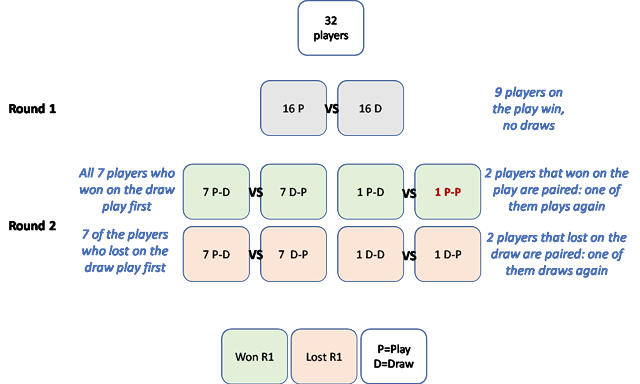
This is just an illustration, and things get more complex round after round, but the basic idea remains: with such a system, after 2 rounds, only 2 players have a non-50% toss rate. With the current system, that number is 16.
I do know that this is an oversimplification, but what I wanted to show you is this: there are a lot of ways to program the pairings in order to make the toss irrelevant, not because it does not impact the outcome of the game, which is impossible to achieve over time, but because even in the very short run, you will win the toss exactly 50% of the time, or close enough that there is no way it could ruin your tournament success.
The good part is that this is easy enough to implement with modern technology: it does not take much to program an algorithm that follows a sample of guidelines to pair people with the play/draw constant in mind, and also, it makes it easier to tell players who is on the when they check the pairing board. The main issue I can see is that happens when a player forgets to check who is on the play, and then has to run to the pairingboard again. This could potentially create some delays in the first few events, especially when dealing with 2000+ players GPs where going through the crowd can take time. But more and more players are now checking their pairings online, and that trend will obviously keep going. You could also say that table 424 is now divided between table 424 A and 424 B (A being on side, B the other) and player A always win the toss. There are quite a lot of solutions to keep the potential issues under control, and I would not expect any long-term consequences.
The last merit is that such a system does prevent cheating. I honestly think that cheating is not a super common occurrence right now, but what do I know? And even if you get cheated once every hundred matches, it is still not acceptable at all ad makes for a terrible experience. I have heard of people making sure they roll the dice in a way that they “kind of” control the outcome, mostly by making sure they just land flat on the table instead of rolling.
If this is actually possible to execute, it sounds like the easiest cheat ever, and I recently found myself in a position where my opponent rolled two sixes with none of the dices rolling at all. I do not think he was cheating or anything, but the simple fact that I thought about it cast an unpleasant shadow over the rest of the game in my head, which in the end might be the biggest part of the problem: you can perfectly accidently throw your dices in a way where they will not roll as much (that happens to me sometimes, and I feel almost relieved when they land on a low number in those occurrences), and you should not feel uncomfortable for those things.
Tl;dr: the toss by itself is not unfair, and Magic will always give a small edge to whoever wins the toss (sometimes because they get to play, sometimes because they get to draw). There is no super urgent need to fix it, but it still creates frustration and is actually very easy to fix: should we get to it?
Until next time,
Pierre Dagen
Share in Twitter
Share in Facebook



